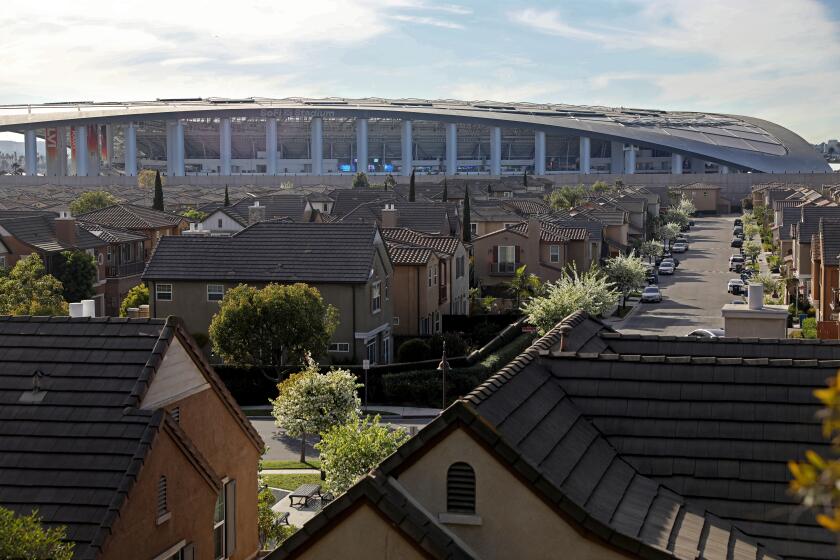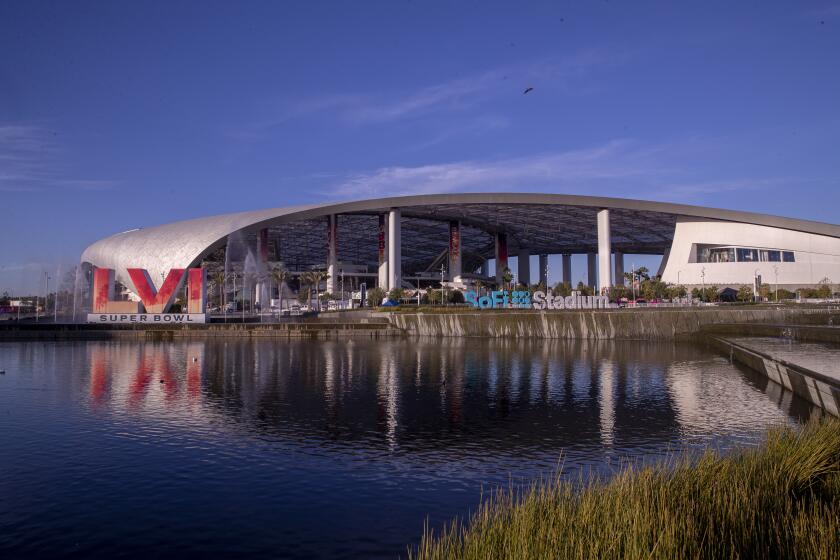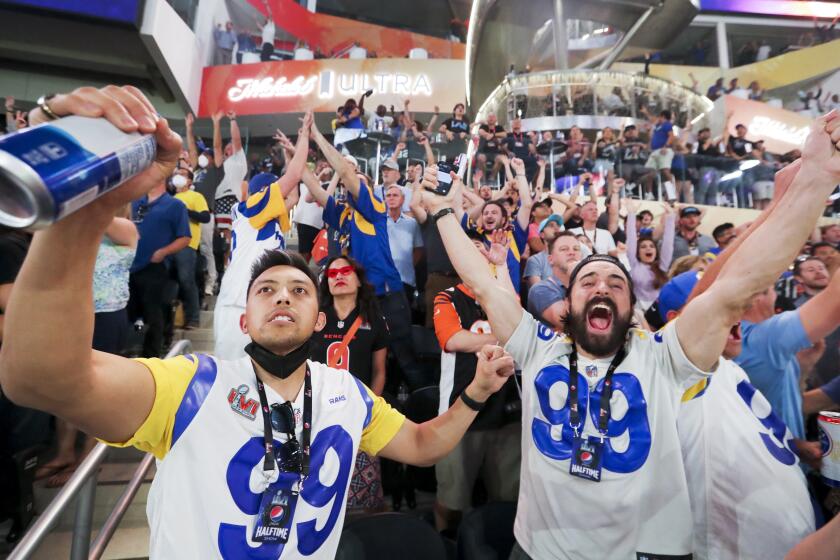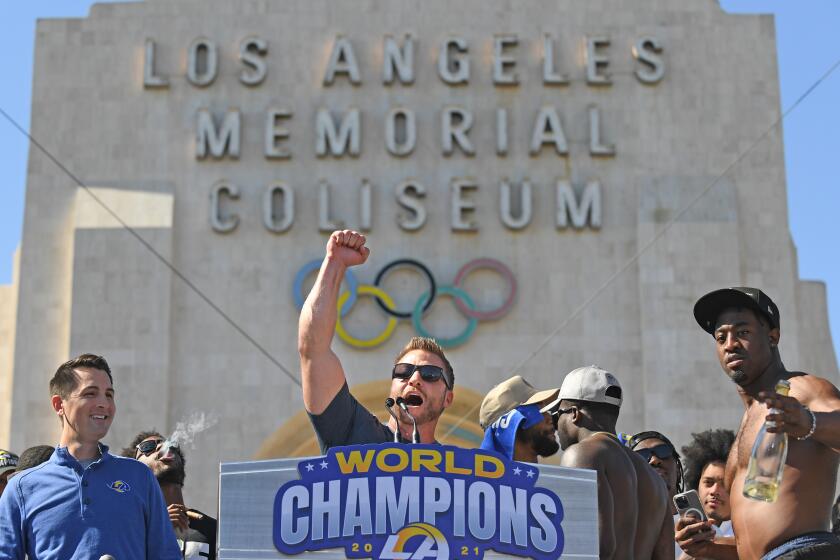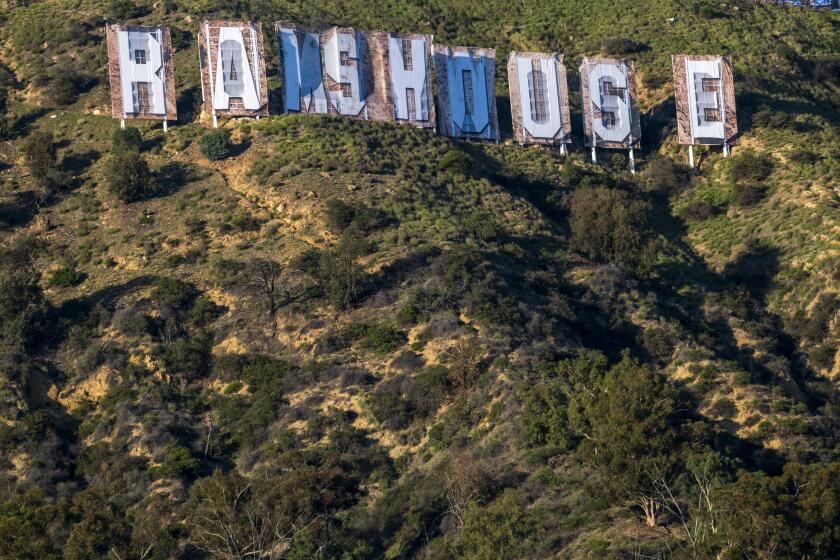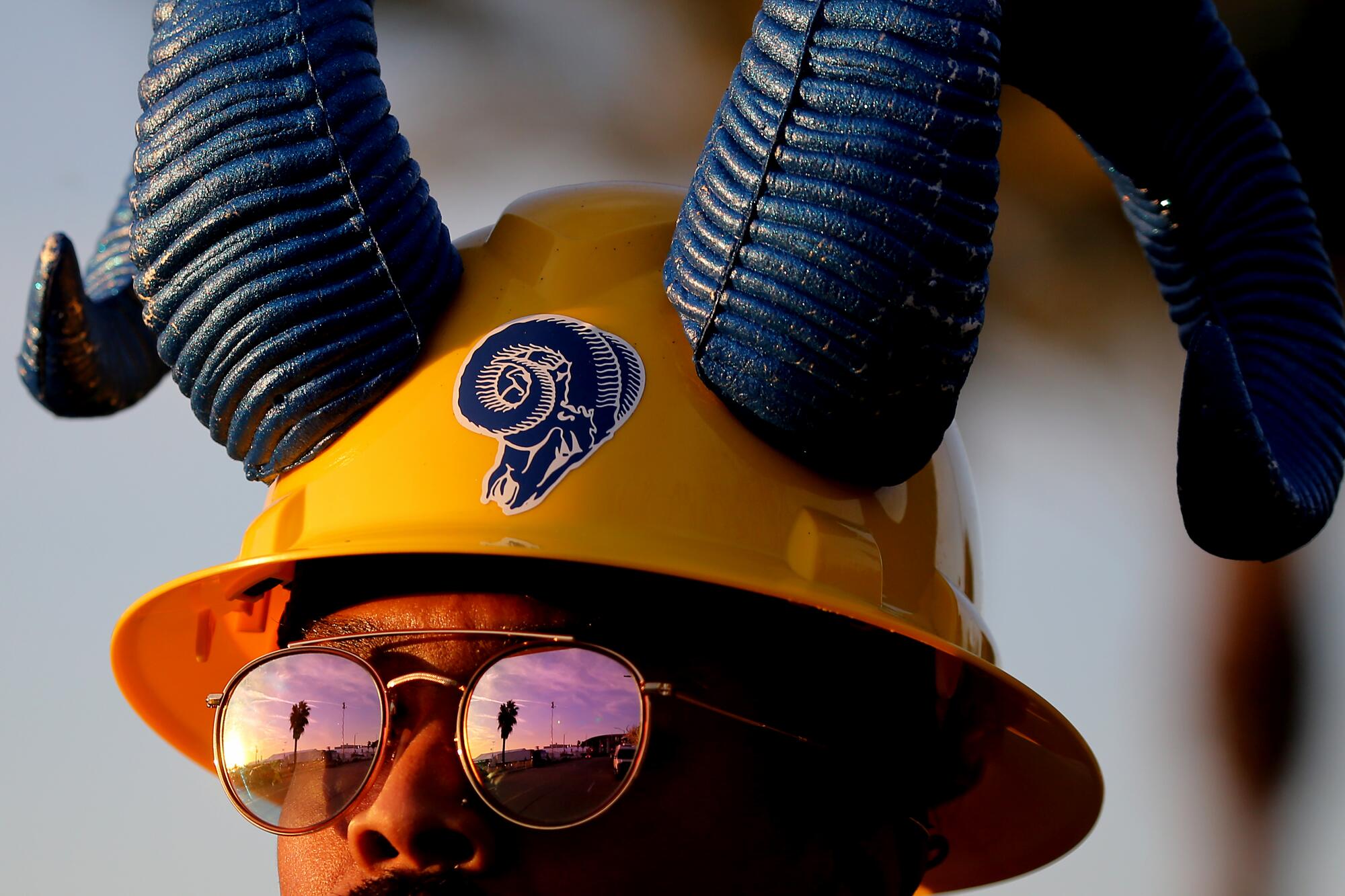
- Share via
In the days counting down to Super Bowl LVI, James T. Butts Jr. has been busier than ever.
Much of the Inglewood mayor’s time is spent at City Hall in a stately conference room lined with framed newspaper clippings and trophy cases filled with mementos like a Moonman award presented to Butts by MTV when the Music Awards were at the Forum in 2014, and a WWE Championship Belt from 2019 when it was announced that WrestleMania would be held in the city.
Two large flat screens at either end play a slide show of Butts’ career highlights — photos of him with Rosa Parks and Barack Obama, and aerial shots of SoFi Stadium, where the Los Angeles Rams will play the Cincinnati Bengals on Sunday.
In interview after interview, he repeats the message that Inglewood is open for business, that it’s safe and welcoming for visitors. He also wants people to know that “the Inglewood Renaissance” — the theme of a glossy 51-page advertiser paid for by the city and distributed last week — wasn’t merely dumb luck. He insists that landing an NFL franchise and a $5-billion sports palace was the result of a vision Butts says he conjured and carefully executed.
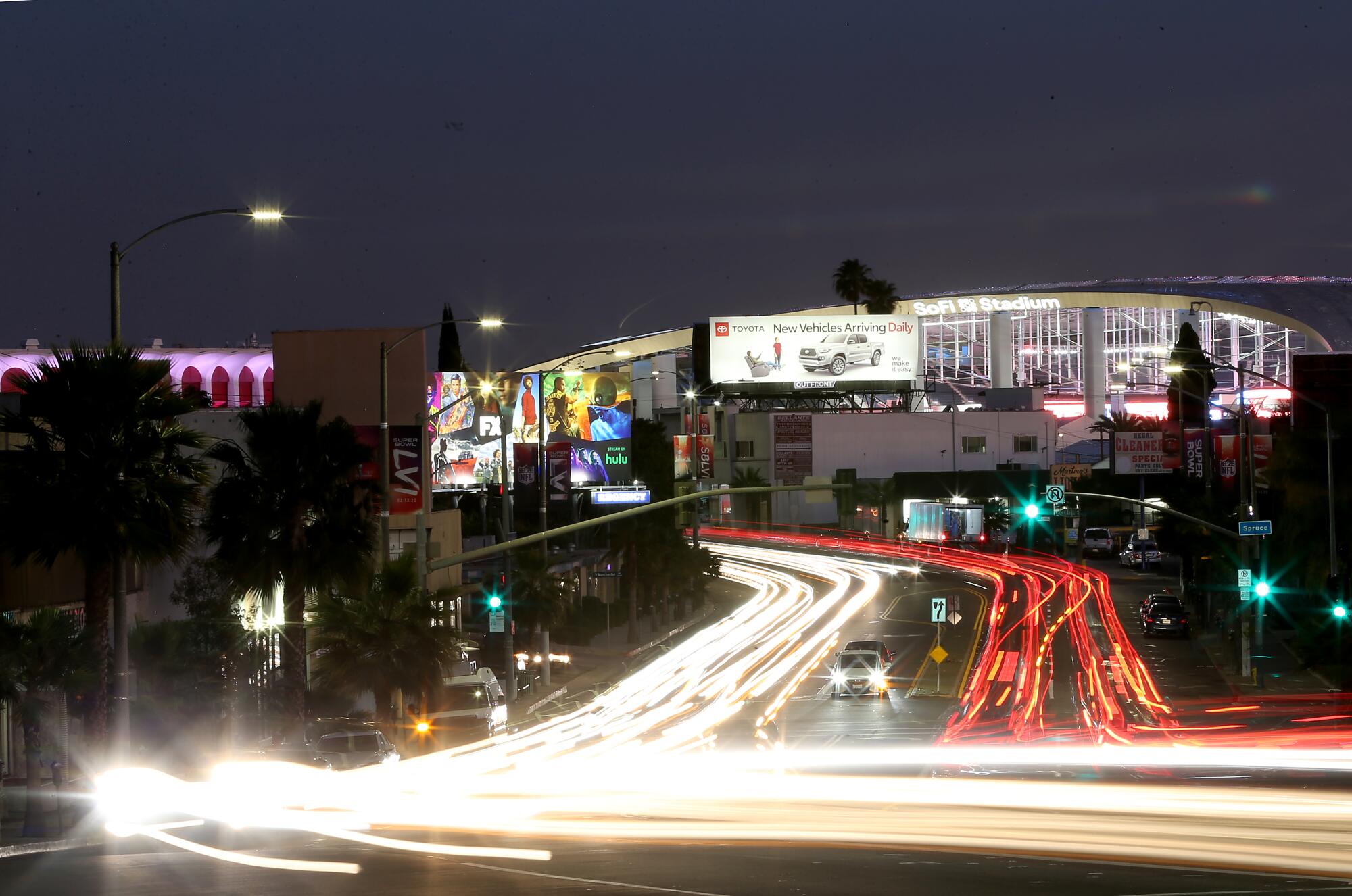
Inglewood is having a moment, and the Super Bowl is just one part of it.
The city in the shadow of Los Angeles International Airport is now home to two NFL teams, likely to be followed by the Clippers if plans for a new NBA stadium come to fruition. It’s become a center for a new generation of Black culture, as chronicled by the HBO show “Insecure.” Real estate values are exploding, making the city a prime spot for gentrifiers while also raising alarms that longtime residents of modest means could be pushed out.
Since the Rams beat the 49ers in the NFC championship two weeks ago, Butts says he’s frequently run into residents who wave and pull him aside while he’s walking to his gym in the morning.
“They say, ‘Mayor, I’ve never been so proud in my life to be from Inglewood.’ They honk, walkers stop,” Butts says.
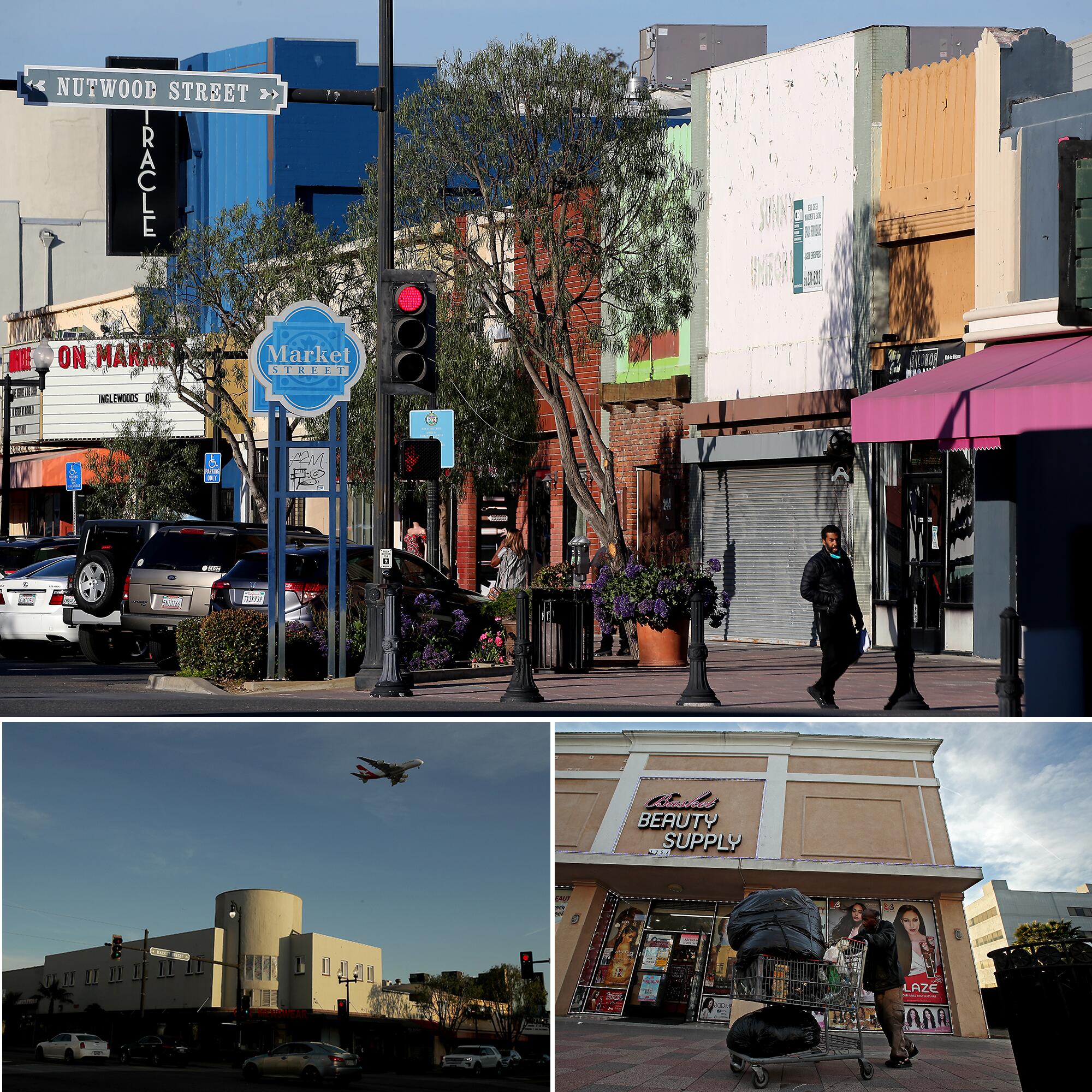
The civic pride comes in part from a recognition from residents about how far Inglewood has come.
The city of nearly 110,000 people went from being the “City of Champions,” with the “Showtime” Lakers and the NHL’s Kings playing at the Forum in the 1980s and ’90s, to an economically stagnant outpost in the decades after both teams left for Staples Center in 1999. For years, the city was also marred by spates of gang-related violence. Inglewood was “always up to no good,” as Tupac Shakur rapped on 1995’s “California Love.”
They say, ‘Mayor, I’ve never been so proud in my life to be from Inglewood.’ They honk, walkers stop.
— James T. Butts Jr., Inglewood mayor
Butts himself has weathered his share of controversies.
A former account manager claimed that the city cooked its books to lure an NFL team under his direction. Activists have accused Butts of not doing enough to protect residents from ballooning rents, and of a lack of transparency around deadly police shootings.
The Super Bowl has allowed the mayor to bask under a warmer spotlight.
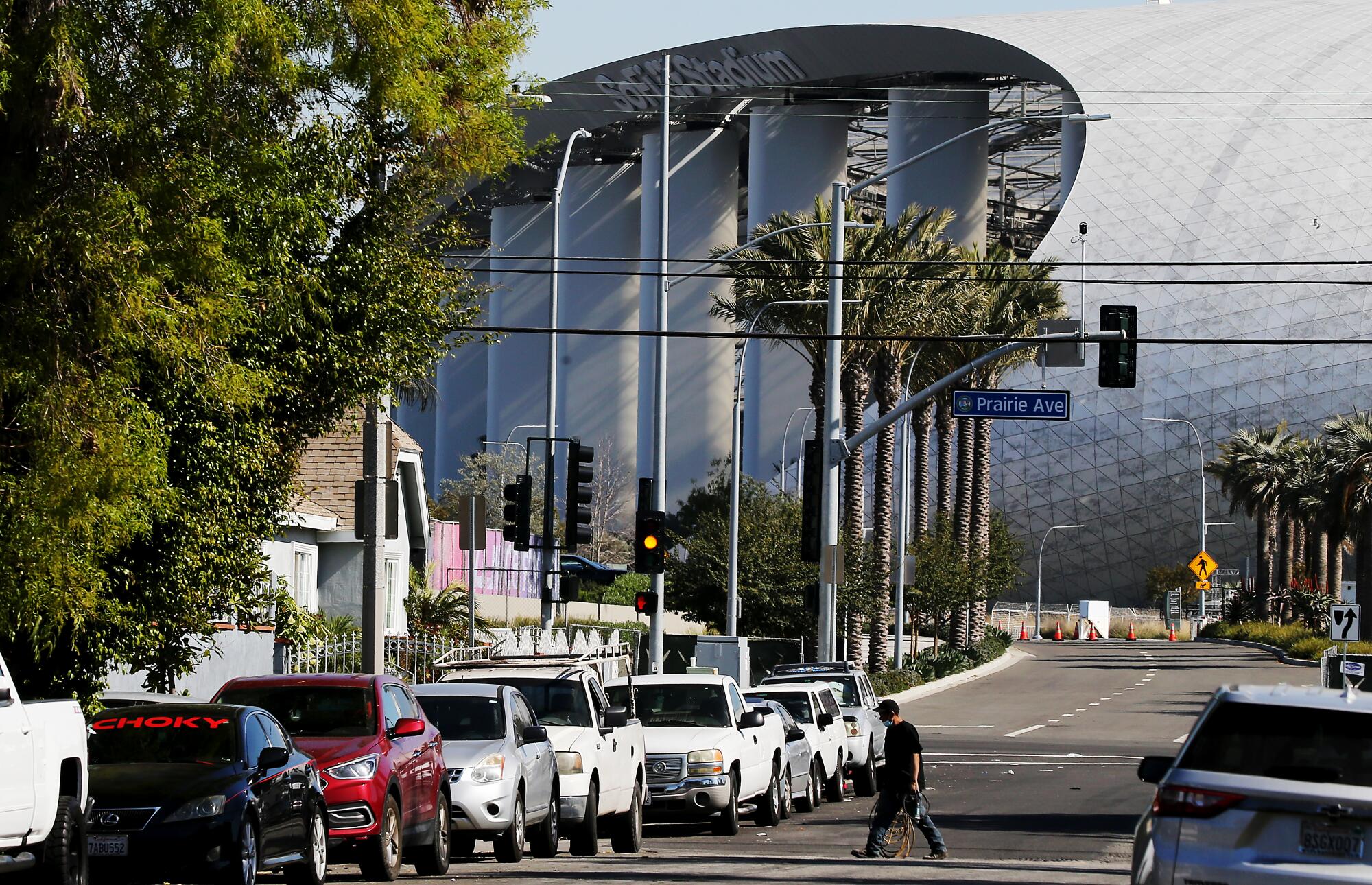
As for the NFL, Sunday’s game represents a capstone on years of community outreach work that began nearly as soon as it was decided that SoFi would be built and that Inglewood would be home to NFL Los Angeles, the league’s new West Coast headquarters.
Local business owners hope the event will provide a projected economic boost of up to $52 million, according to projections.
But the worldwide gaze of the Super Bowl on Inglewood also comes as residents wrestle with what kind of city it has become. Challenges persist regarding heightened traffic, public health and safety, and competition for tourism with the city of Los Angeles. In a city of 110,000, 41% Black and 51% Latino, there’s also plenty of anxiety regarding the threats of gentrification, over-policing and the displacement of the local homeless population.
These are questions Inglewood will grapple with long after the Super Bowl ends and the cameras move on. In the meantime, they’re waiting to see what the nation’s biggest sporting event will mean for a place that yearns to once again be a “City of Champions.”
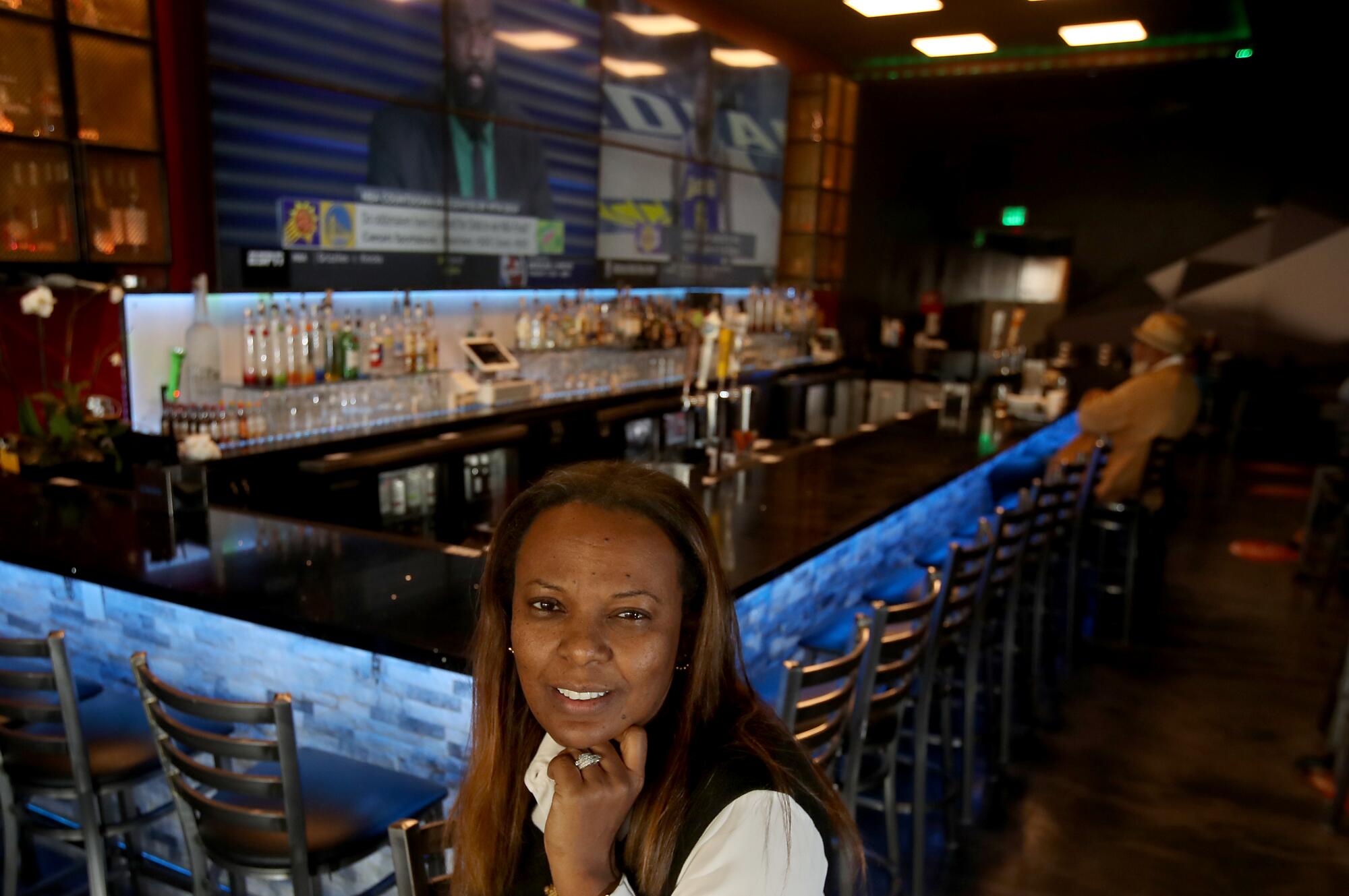
Betty Woldegiorgis operated a bar on Market Street in downtown Inglewood for nearly 20 years before, she says, being forced out by high rents in 2019. She secured a new location in what had been a discount store directly across the street.
She hoped to open her new place in 2020, but then COVID-19 struck. Woldegiorgis was forced to sit on the property, paying rent and watching her savings dwindle. The Nile finally opened on New Year’s Day, 2021.
Home sellers profit from area development, including SoFi Stadium, site of Super Bowl 2022. Rents are up, too. Now, the city is less affordable.
A few days ahead of Sunday’s game, she was at the Nile triple-checking her to-do list while directing a small cleaning crew of family, friends, and employees.
She’s budgeted for more alcohol and Super Bowl drink specials. Just last week, she went to ABC Bartending School in Culver City to recruit additional bartenders. She also spent thousands on constructing a DJ booth, a way to keep the party going — especially if the Rams win.
For the small-business owner, Super Bowl LVI represents a once-in-a-lifetime chance to put her new business in the black.
“We want it to be smooth and now, because of social media, we don’t want any bad reviews,” she said. “We want to give people our best, the best of Inglewood.”
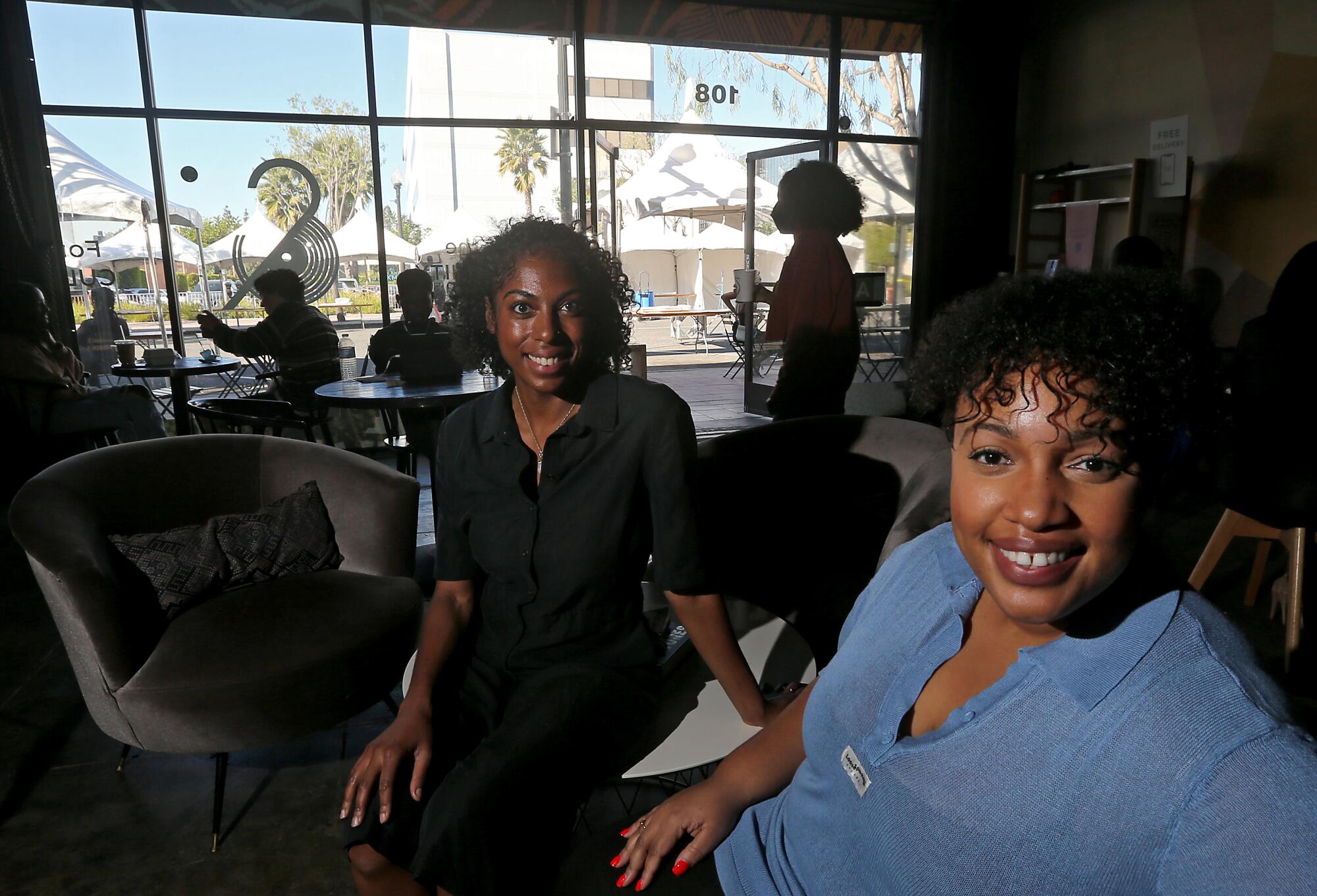
A block away from the Nile on Market Street sits Sip & Sonder, a coffee shop owned and operated by Amanda-Jane Thomas and Shanita Nicholas. Like Woldegiorgis, Thomas and Nicholas are hustling to prepare for the Super Bowl amid the challenges of the COVID pandemic.
Sip & Sonder will be open Sunday, and also will serve coffee at the NFL’s official tailgate. Pulling both off is a feat Thomas and Nicholas agree is possible only because they have each other as partners — not to mention the benefit of five degrees in business and law from Harvard and Columbia between them.
“It does not help that there is a major supply-chain backup,” Nicholas said.
“We have shifted direction a number of times since we began planning in the fall,” Thomas added. “Being flexible has been our baseline.”
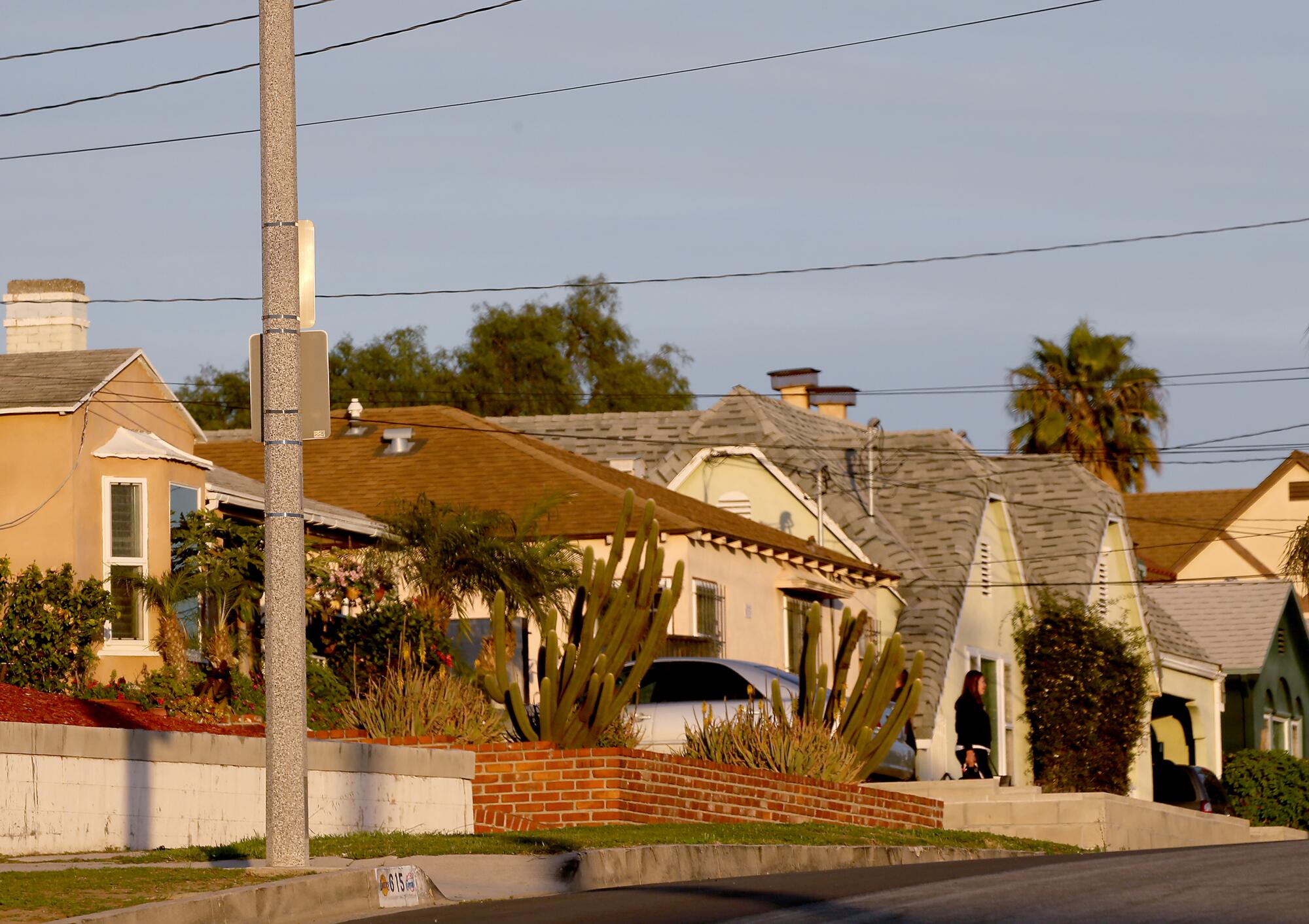
Despite the many signs of Inglewood’s renewal, there are still plenty of cracks for locals to fall through and consequences to the city’s swift transition. Some see rising home values and the recent clearing of homeless camps as signs of more displacement to come. Some longtime community members feel they’ve been left out of the loop regarding big changes.
Asha Grant, owner of Salt Eaters Bookshop on Queen Street, said she’s heard nothing from the city of Inglewood or the NFL about what to expect Sunday. Naturally, she had questions about how the city was going to prepare for an influx of thousands of tourists.
Grant’s Black feminist bookstore wasn’t exactly designed for tourists. Instead, it serves a dedicated community of locals. Grant is concerned how they, her regulars, will be affected.
“I’m not sure how to deal with tons and tons of people who are not coming to Inglewood necessarily because they are interested in the community,” Grant said. “It is my hope that there are efforts to make sure that the community’s needs are put first. And that, hopefully, we don’t have to navigate an increased police presence.”
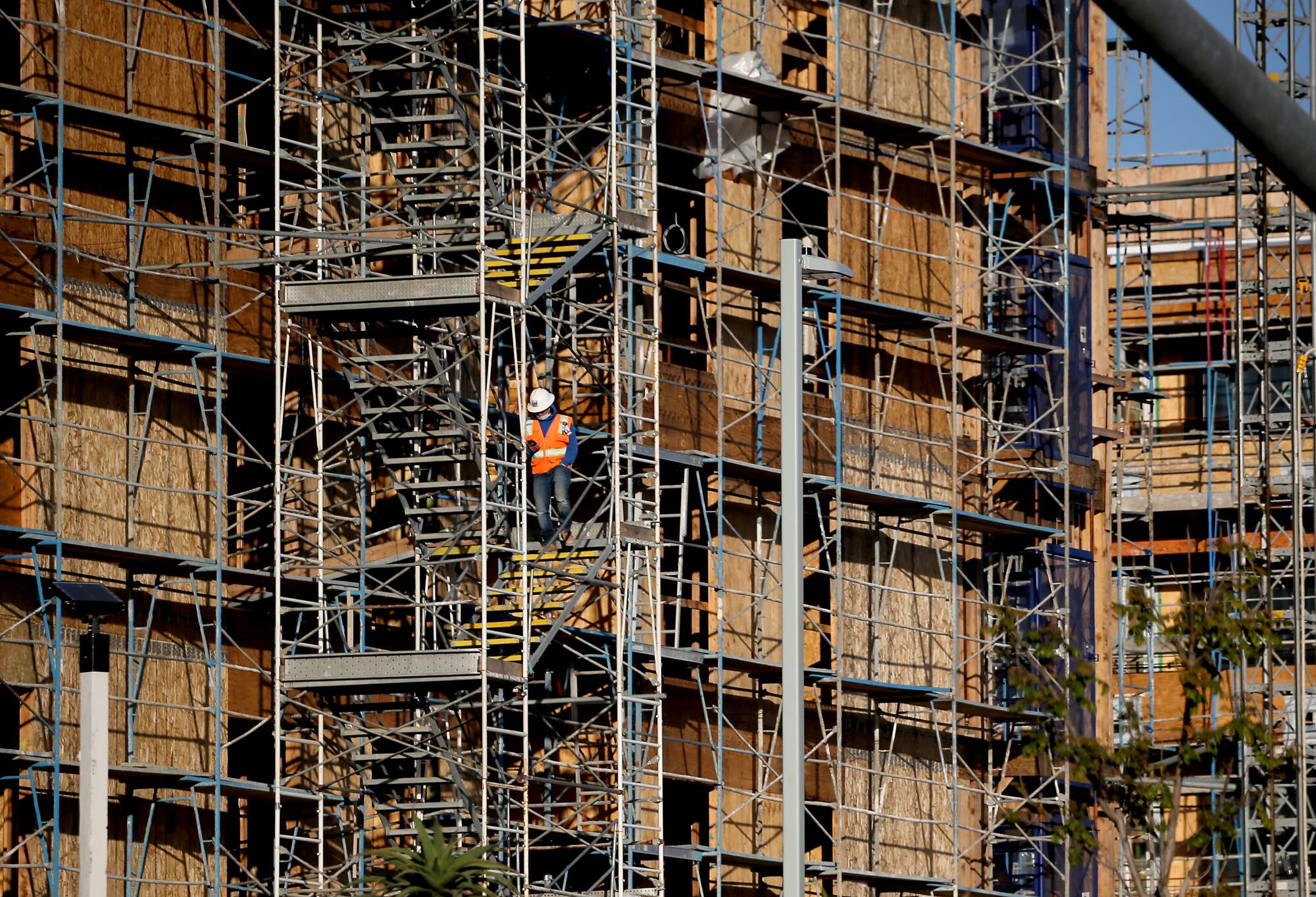
Despite Inglewood’s revived status as a sports and entertainment hub, its government is still small. In the buildup to the game, resources and attention have gone primarily to shoring up relationships with its corporate partners, putting out last-minute fires and taking advantage of the good press for as long as it lasts.
It’s all toward the greater good, said Butts.
“The whole reason to attract sports, entertainment and retail is for the residual impact all of that is going to have on jobs for people, revenues for the city to renew its infrastructure, and to have outside people come to the city to spend their money on local businesses,” he said.
Construction of the 70,000-seat, state-of-the-art arena on the site of the old Hollywood Park Racetrack created more than 17,000 jobs and led to Inglewood businesses earning more than $105 million in revenue and residents earning more than $38 million in wages, according to NFL estimates.
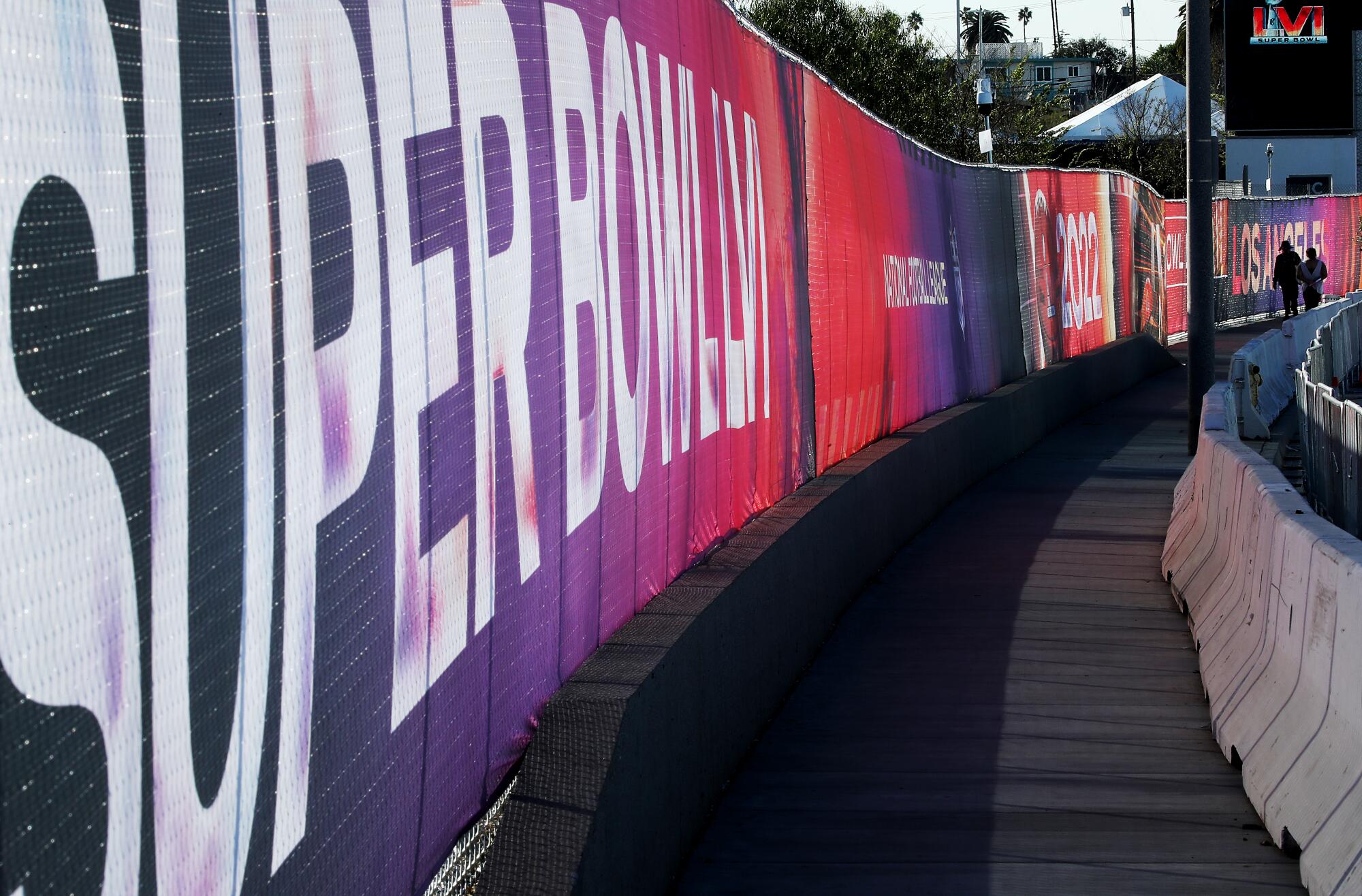
Today, more than 1,200 of the workers at SoFi are Inglewood residents. That number is the result of a provision the city baked into the construction deal, Butts said. The mayor also insisted on “hard to hire” clauses which prevent job seekers from being disqualified solely due to a felony conviction.
Other businesses have followed SoFi’s lead with new coffee shops, restaurants and bookstores popping up since 2015 when the project was announced. The NFL has since relocated its media unit from Culver City to a new 200,000-square-foot facility neighboring the stadium.
“I can understand how so much development so fast could leave some people feeling left behind,” Butts said. “But I say to them that we have a personal responsibility to ourselves and our children to prepare ourselves as best we can.”
Butts dismissed outright questions about whether development is merely gentrification by another name.
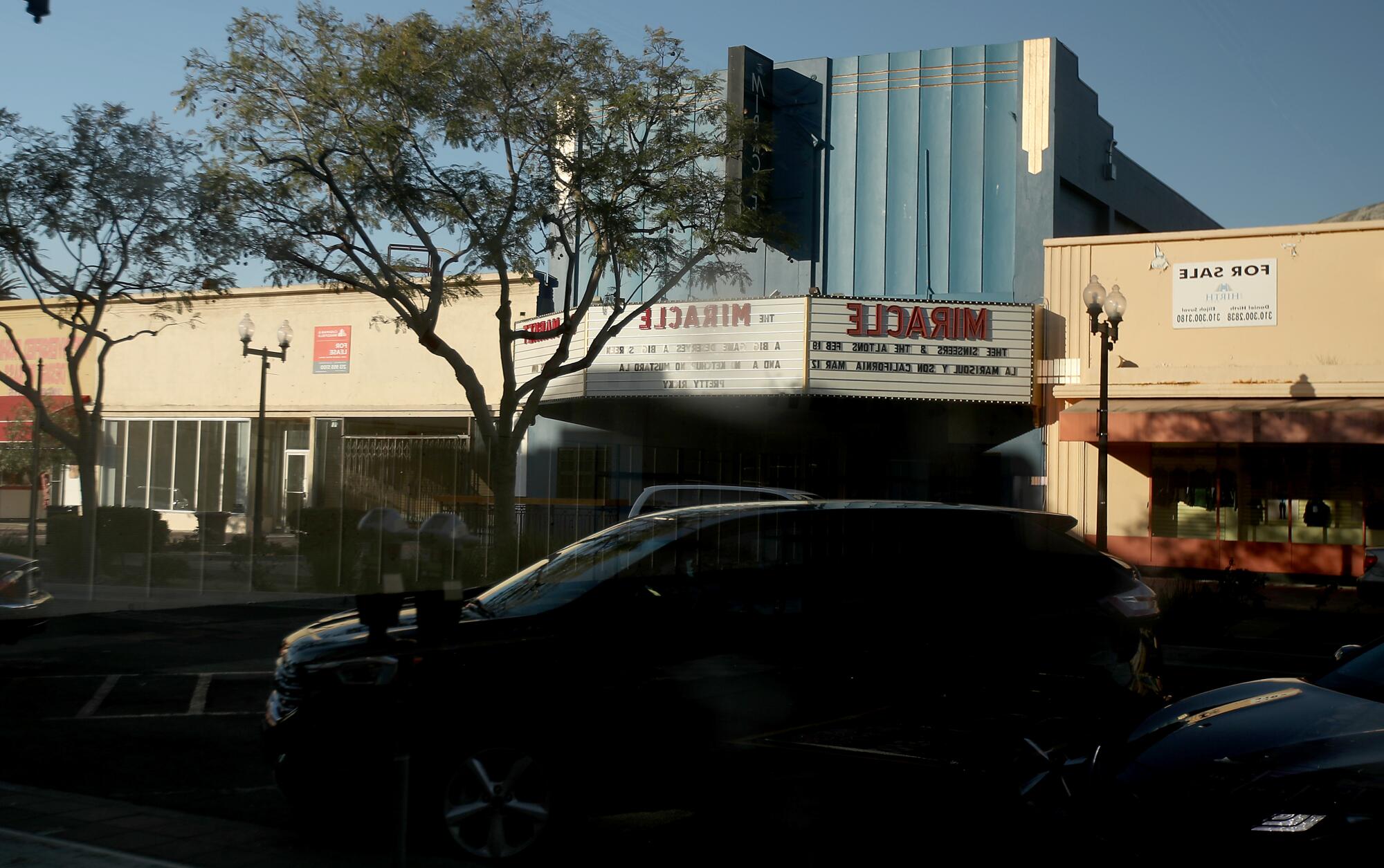
“This is not gentrification,” he said. “Gentrification is when you have an impoverished area and people who have higher socioeconomic standing come in, buy property, renovate it and raise the value so the people that formerly could afford to live there can’t anymore.
“What we’ve done in Inglewood is different,” he continued. “We raised the value of properties that are owned by a population that is 92% Black and brown. Now they’re accumulating generational wealth, the same as their neighbors in Manhattan Beach, Torrance, Pasadena, Redondo Beach.”
Whether the Super Bowl and the SoFi Stadium will have a positive long-term impact on the lives of Inglewood residents remains to be seen. But there are some signs of lasting investment.
The NFL and the Rams have launched a handful of programs in partnership with the city to introduce themselves to the community.
So far the Rams have donated $185,000 to the Inglewood Unified School District and local organizations combating food insecurity. The team refurbished the Morningside High School football field and created a handful of summer internships for IUSD high school students. Rams players also provided more than 2,000 IUSD students with backpacks and school supplies.
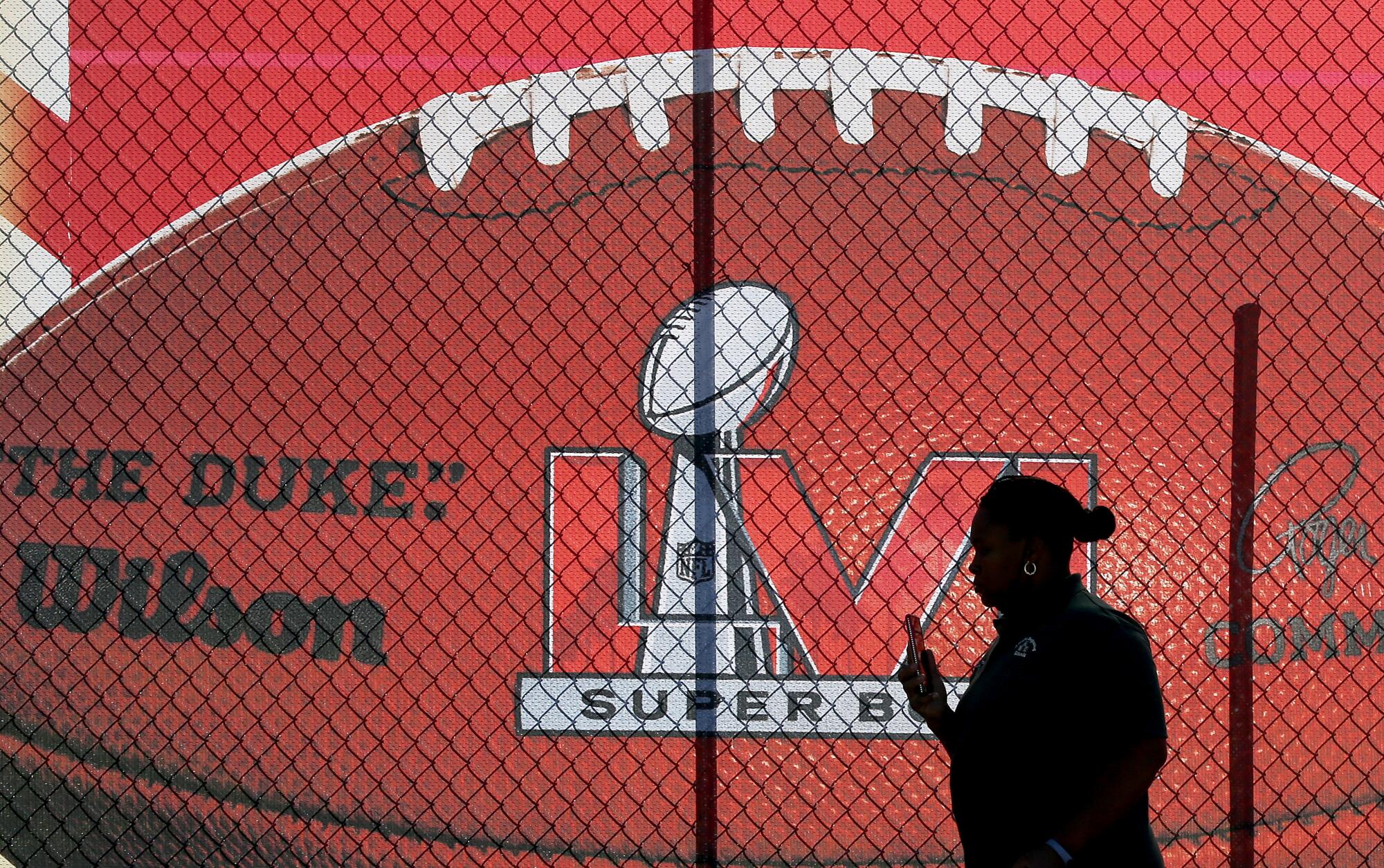
SoFi Stadium and Hollywood Park staff have cleaned streets, painted benches and planted more than 2,000 flowers across Inglewood in partnership with the city. Last year, Hollywood Park provided more than 97,000 pounds of food to the community through food drives and other events, including a Thanksgiving turkey giveaway.
In preparation for the game, the NFL and the Los Angeles Super Bowl Host Committee launched the Super Bowl LVI Business Connect program to identify and prepare L.A. County minority, women, LGBTQ+ and veteran-owned businesses to participate in the procurement process for Super Bowl LVI.
The NFL and the Los Angeles Super Bowl Host Committee also awarded 50 “unsung hero” grass-roots organizations grants of $10,000 each. Inglewood-based grantees include Urban Scholar Academy, an organization that provides tutoring throughout the L.A. area; Loving Hands Community Care, which offers support to families who have lost children to gang violence; and 40 Love Foundation, which uses tennis to help develop youths on and off the court.
Butts insisted that all of this, plus a Super Bowl featuring the home team, is reason to celebrate, not worry.
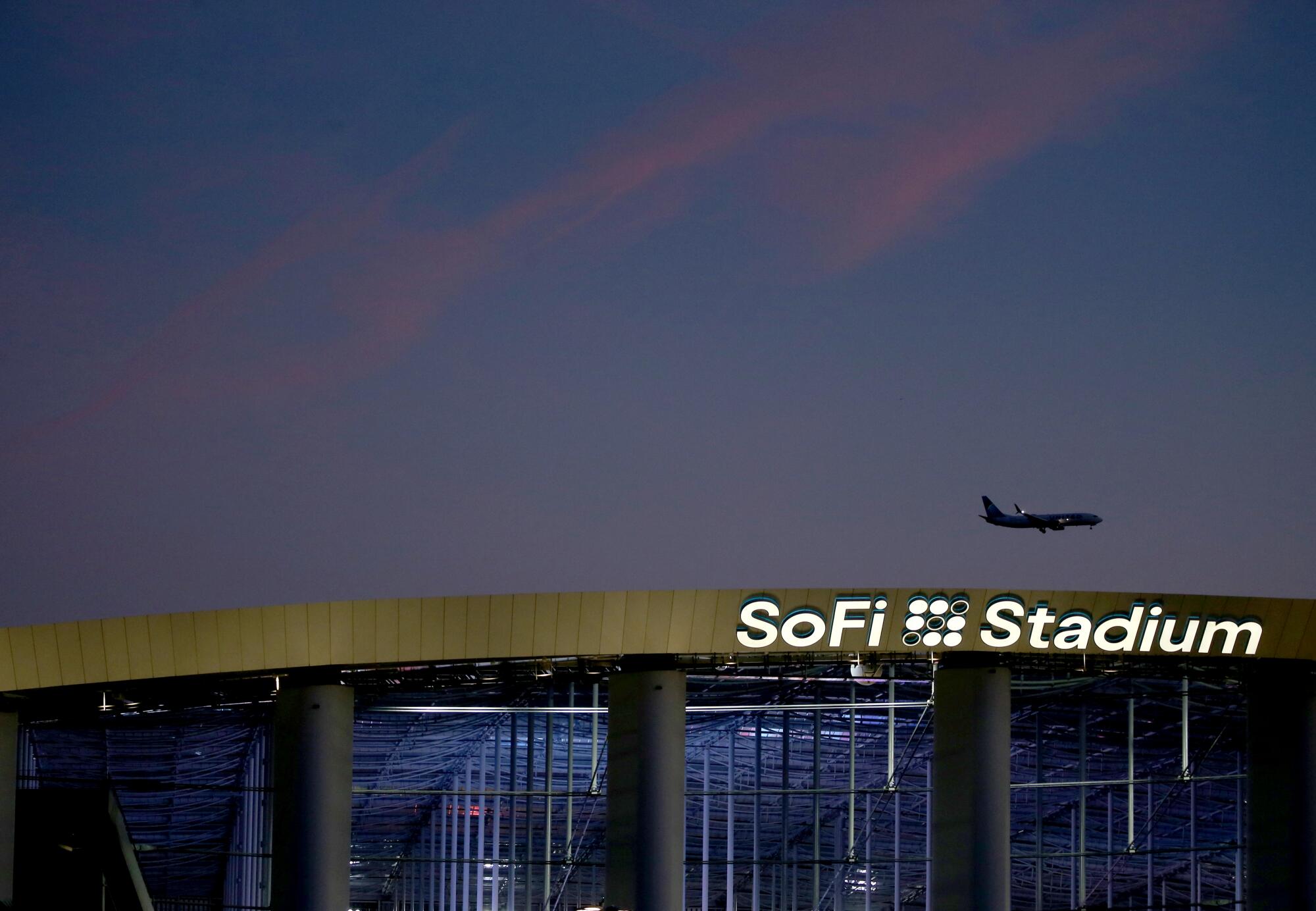
“There’s really not much use in being nervous,” the mayor said. “That nervous energy should be used toward strategizing for success.”
Asha Grant of the Salt Eaters Bookshop said, despite her concerns, that she is preparing for Super Bowl Sunday, noting that previous games have brought in new customers. They amble into the shop dressed in Rams jerseys after games, she said, curious what might be inside.
“I’m trying to gather some folks that would be interested in volunteering in the space, to help folks who might have questions about us and what we offer,” Grant said. “I still need to be open because I need to make money. I’m not in a position to take off Super Bowl weekend because I’m anxious about what it might bring. I won’t do that.”
More to Read
Sign up for Essential California
The most important California stories and recommendations in your inbox every morning.
You may occasionally receive promotional content from the Los Angeles Times.
